The Myth of Meritocracy in the Australian Education System
VerifiedAdded on 2022/12/16
|8
|2151
|263
Essay
AI Summary
This essay examines the concept of meritocracy within the Australian education system, evaluating whether it functions as a reality or a myth. It explores the influence of socioeconomic factors and parental wealth, arguing that the system leans towards parentocracy rather than pure meritocracy. The essay discusses how non-merit factors, such as race, gender, and financial stability, impact students' academic performance and outcomes, potentially leading to inequalities and affecting future career prospects. The analysis highlights the importance of considering both merit-based and non-merit factors for a comprehensive understanding of the Australian education system. The essay concludes by emphasizing the need for a balanced approach to promote equality and improve student outcomes.
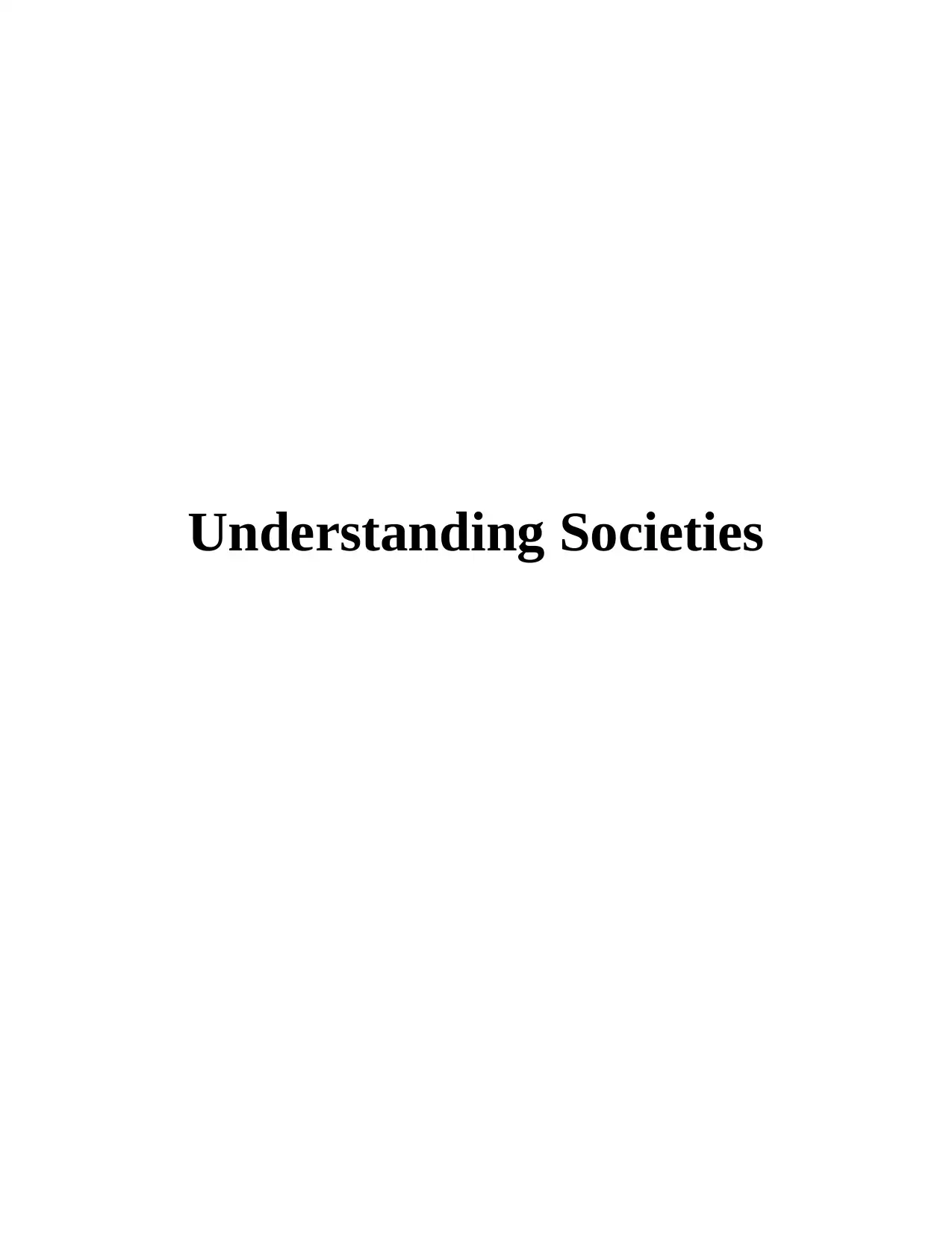
Understanding Societies
Paraphrase This Document
Need a fresh take? Get an instant paraphrase of this document with our AI Paraphraser
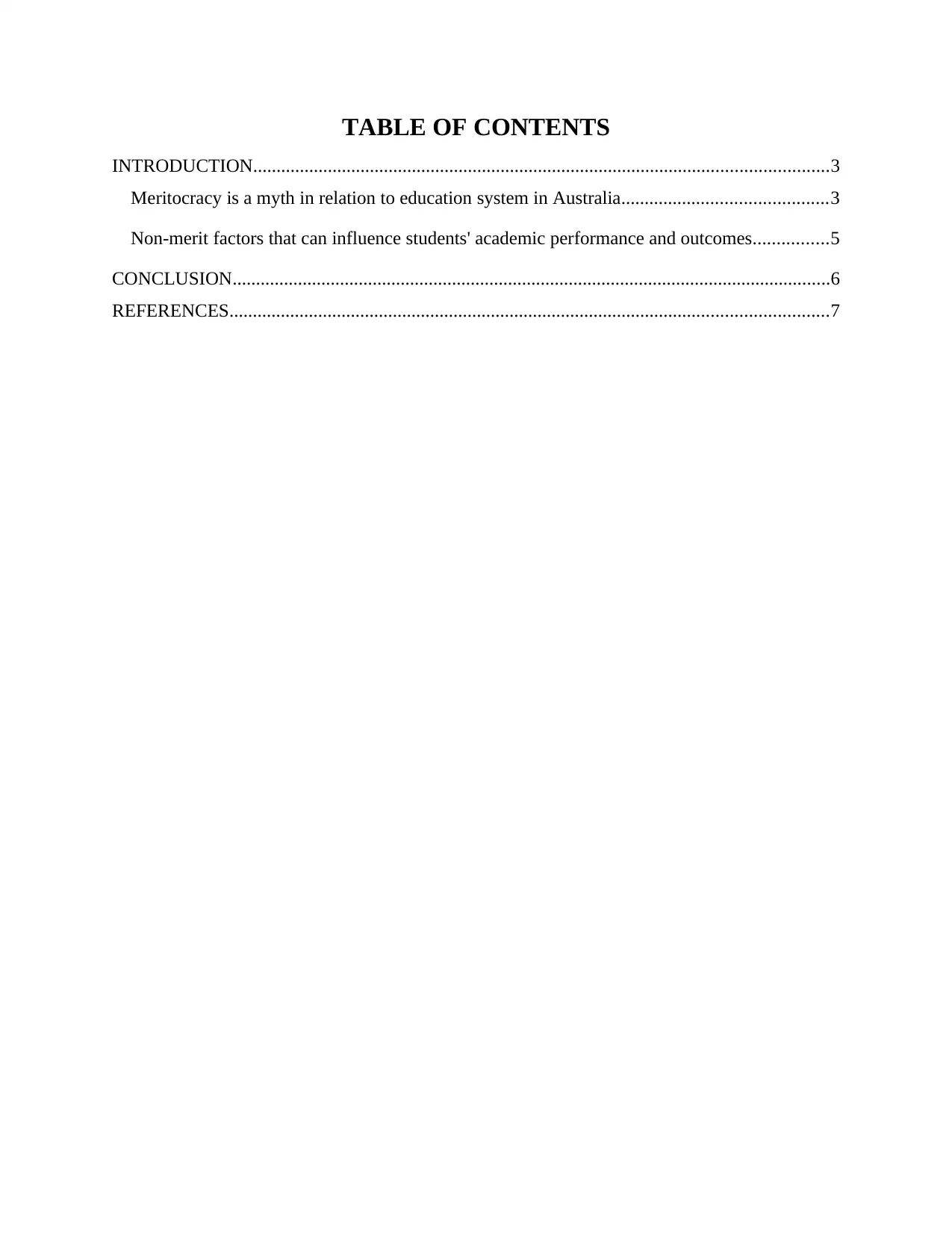
TABLE OF CONTENTS
INTRODUCTION...........................................................................................................................3
Meritocracy is a myth in relation to education system in Australia............................................3
Non-merit factors that can influence students' academic performance and outcomes................5
CONCLUSION................................................................................................................................6
REFERENCES................................................................................................................................7
INTRODUCTION...........................................................................................................................3
Meritocracy is a myth in relation to education system in Australia............................................3
Non-merit factors that can influence students' academic performance and outcomes................5
CONCLUSION................................................................................................................................6
REFERENCES................................................................................................................................7
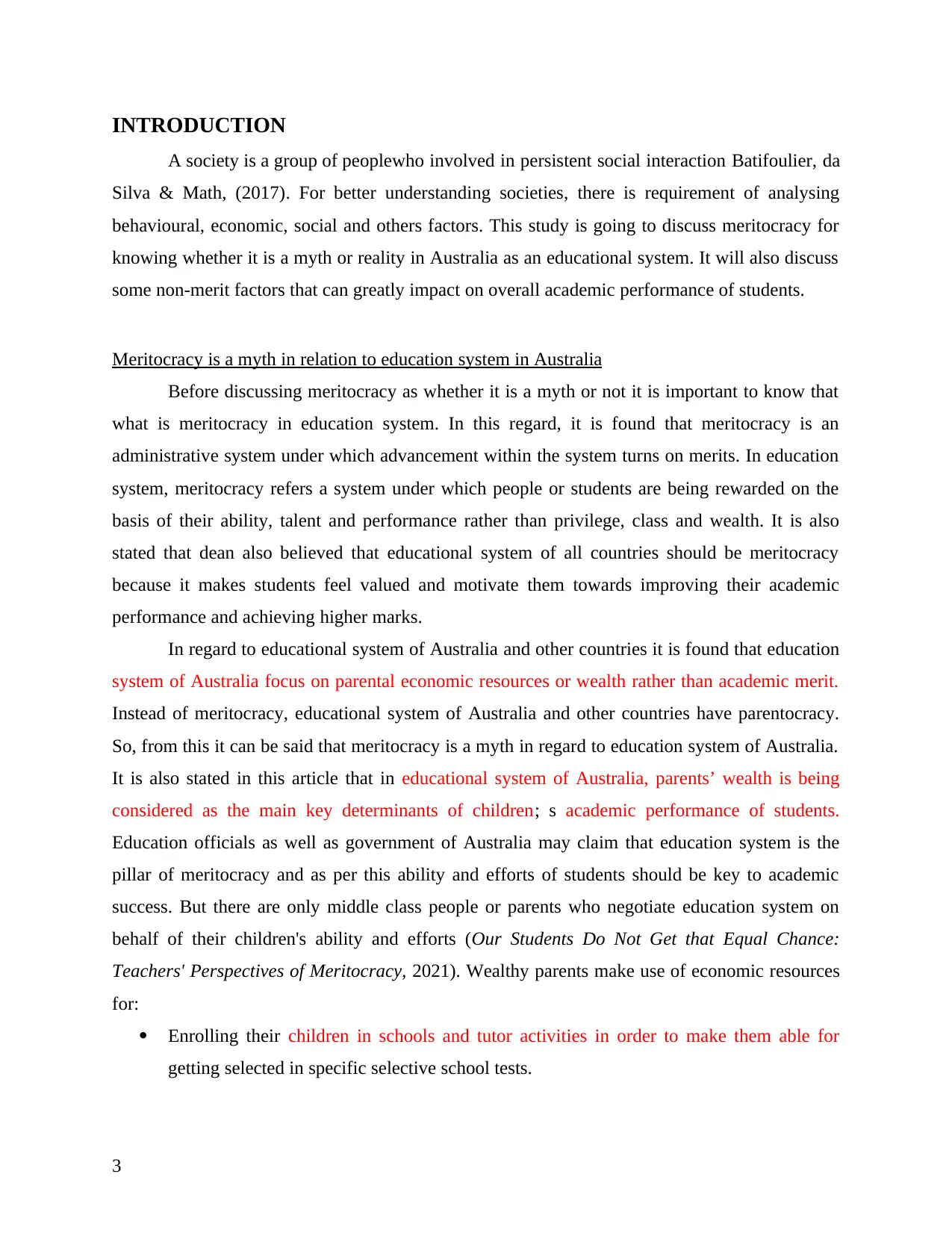
INTRODUCTION
A society is a group of peoplewho involved in persistent social interaction Batifoulier, da
Silva & Math, (2017). For better understanding societies, there is requirement of analysing
behavioural, economic, social and others factors. This study is going to discuss meritocracy for
knowing whether it is a myth or reality in Australia as an educational system. It will also discuss
some non-merit factors that can greatly impact on overall academic performance of students.
Meritocracy is a myth in relation to education system in Australia
Before discussing meritocracy as whether it is a myth or not it is important to know that
what is meritocracy in education system. In this regard, it is found that meritocracy is an
administrative system under which advancement within the system turns on merits. In education
system, meritocracy refers a system under which people or students are being rewarded on the
basis of their ability, talent and performance rather than privilege, class and wealth. It is also
stated that dean also believed that educational system of all countries should be meritocracy
because it makes students feel valued and motivate them towards improving their academic
performance and achieving higher marks.
In regard to educational system of Australia and other countries it is found that education
system of Australia focus on parental economic resources or wealth rather than academic merit.
Instead of meritocracy, educational system of Australia and other countries have parentocracy.
So, from this it can be said that meritocracy is a myth in regard to education system of Australia.
It is also stated in this article that in educational system of Australia, parents’ wealth is being
considered as the main key determinants of children; s academic performance of students.
Education officials as well as government of Australia may claim that education system is the
pillar of meritocracy and as per this ability and efforts of students should be key to academic
success. But there are only middle class people or parents who negotiate education system on
behalf of their children's ability and efforts (Our Students Do Not Get that Equal Chance:
Teachers' Perspectives of Meritocracy, 2021). Wealthy parents make use of economic resources
for:
Enrolling their children in schools and tutor activities in order to make them able for
getting selected in specific selective school tests.
3
A society is a group of peoplewho involved in persistent social interaction Batifoulier, da
Silva & Math, (2017). For better understanding societies, there is requirement of analysing
behavioural, economic, social and others factors. This study is going to discuss meritocracy for
knowing whether it is a myth or reality in Australia as an educational system. It will also discuss
some non-merit factors that can greatly impact on overall academic performance of students.
Meritocracy is a myth in relation to education system in Australia
Before discussing meritocracy as whether it is a myth or not it is important to know that
what is meritocracy in education system. In this regard, it is found that meritocracy is an
administrative system under which advancement within the system turns on merits. In education
system, meritocracy refers a system under which people or students are being rewarded on the
basis of their ability, talent and performance rather than privilege, class and wealth. It is also
stated that dean also believed that educational system of all countries should be meritocracy
because it makes students feel valued and motivate them towards improving their academic
performance and achieving higher marks.
In regard to educational system of Australia and other countries it is found that education
system of Australia focus on parental economic resources or wealth rather than academic merit.
Instead of meritocracy, educational system of Australia and other countries have parentocracy.
So, from this it can be said that meritocracy is a myth in regard to education system of Australia.
It is also stated in this article that in educational system of Australia, parents’ wealth is being
considered as the main key determinants of children; s academic performance of students.
Education officials as well as government of Australia may claim that education system is the
pillar of meritocracy and as per this ability and efforts of students should be key to academic
success. But there are only middle class people or parents who negotiate education system on
behalf of their children's ability and efforts (Our Students Do Not Get that Equal Chance:
Teachers' Perspectives of Meritocracy, 2021). Wealthy parents make use of economic resources
for:
Enrolling their children in schools and tutor activities in order to make them able for
getting selected in specific selective school tests.
3
⊘ This is a preview!⊘
Do you want full access?
Subscribe today to unlock all pages.

Trusted by 1+ million students worldwide
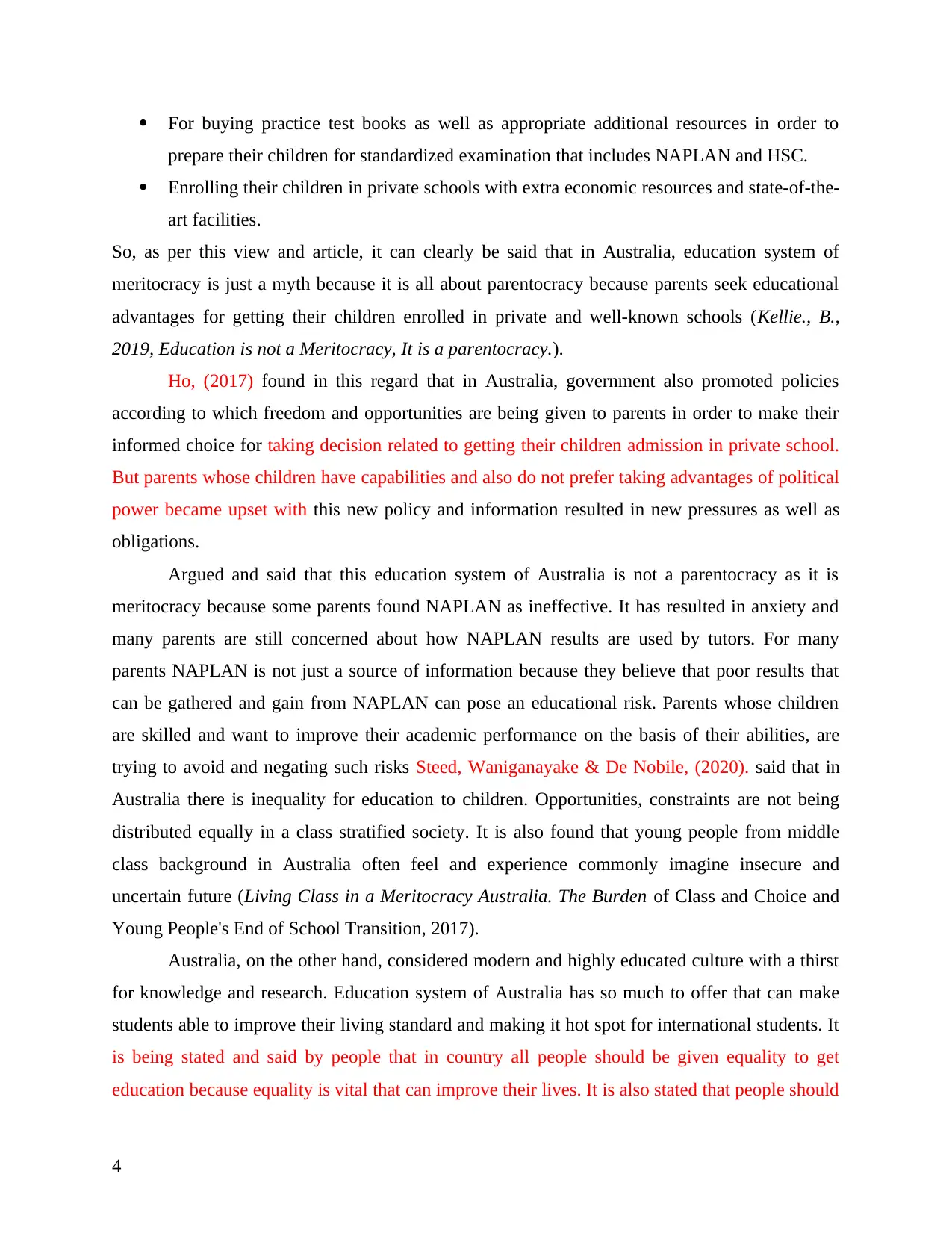
For buying practice test books as well as appropriate additional resources in order to
prepare their children for standardized examination that includes NAPLAN and HSC.
Enrolling their children in private schools with extra economic resources and state-of-the-
art facilities.
So, as per this view and article, it can clearly be said that in Australia, education system of
meritocracy is just a myth because it is all about parentocracy because parents seek educational
advantages for getting their children enrolled in private and well-known schools (Kellie., B.,
2019, Education is not a Meritocracy, It is a parentocracy.).
Ho, (2017) found in this regard that in Australia, government also promoted policies
according to which freedom and opportunities are being given to parents in order to make their
informed choice for taking decision related to getting their children admission in private school.
But parents whose children have capabilities and also do not prefer taking advantages of political
power became upset with this new policy and information resulted in new pressures as well as
obligations.
Argued and said that this education system of Australia is not a parentocracy as it is
meritocracy because some parents found NAPLAN as ineffective. It has resulted in anxiety and
many parents are still concerned about how NAPLAN results are used by tutors. For many
parents NAPLAN is not just a source of information because they believe that poor results that
can be gathered and gain from NAPLAN can pose an educational risk. Parents whose children
are skilled and want to improve their academic performance on the basis of their abilities, are
trying to avoid and negating such risks Steed, Waniganayake & De Nobile, (2020). said that in
Australia there is inequality for education to children. Opportunities, constraints are not being
distributed equally in a class stratified society. It is also found that young people from middle
class background in Australia often feel and experience commonly imagine insecure and
uncertain future (Living Class in a Meritocracy Australia. The Burden of Class and Choice and
Young People's End of School Transition, 2017).
Australia, on the other hand, considered modern and highly educated culture with a thirst
for knowledge and research. Education system of Australia has so much to offer that can make
students able to improve their living standard and making it hot spot for international students. It
is being stated and said by people that in country all people should be given equality to get
education because equality is vital that can improve their lives. It is also stated that people should
4
prepare their children for standardized examination that includes NAPLAN and HSC.
Enrolling their children in private schools with extra economic resources and state-of-the-
art facilities.
So, as per this view and article, it can clearly be said that in Australia, education system of
meritocracy is just a myth because it is all about parentocracy because parents seek educational
advantages for getting their children enrolled in private and well-known schools (Kellie., B.,
2019, Education is not a Meritocracy, It is a parentocracy.).
Ho, (2017) found in this regard that in Australia, government also promoted policies
according to which freedom and opportunities are being given to parents in order to make their
informed choice for taking decision related to getting their children admission in private school.
But parents whose children have capabilities and also do not prefer taking advantages of political
power became upset with this new policy and information resulted in new pressures as well as
obligations.
Argued and said that this education system of Australia is not a parentocracy as it is
meritocracy because some parents found NAPLAN as ineffective. It has resulted in anxiety and
many parents are still concerned about how NAPLAN results are used by tutors. For many
parents NAPLAN is not just a source of information because they believe that poor results that
can be gathered and gain from NAPLAN can pose an educational risk. Parents whose children
are skilled and want to improve their academic performance on the basis of their abilities, are
trying to avoid and negating such risks Steed, Waniganayake & De Nobile, (2020). said that in
Australia there is inequality for education to children. Opportunities, constraints are not being
distributed equally in a class stratified society. It is also found that young people from middle
class background in Australia often feel and experience commonly imagine insecure and
uncertain future (Living Class in a Meritocracy Australia. The Burden of Class and Choice and
Young People's End of School Transition, 2017).
Australia, on the other hand, considered modern and highly educated culture with a thirst
for knowledge and research. Education system of Australia has so much to offer that can make
students able to improve their living standard and making it hot spot for international students. It
is being stated and said by people that in country all people should be given equality to get
education because equality is vital that can improve their lives. It is also stated that people should
4
Paraphrase This Document
Need a fresh take? Get an instant paraphrase of this document with our AI Paraphraser
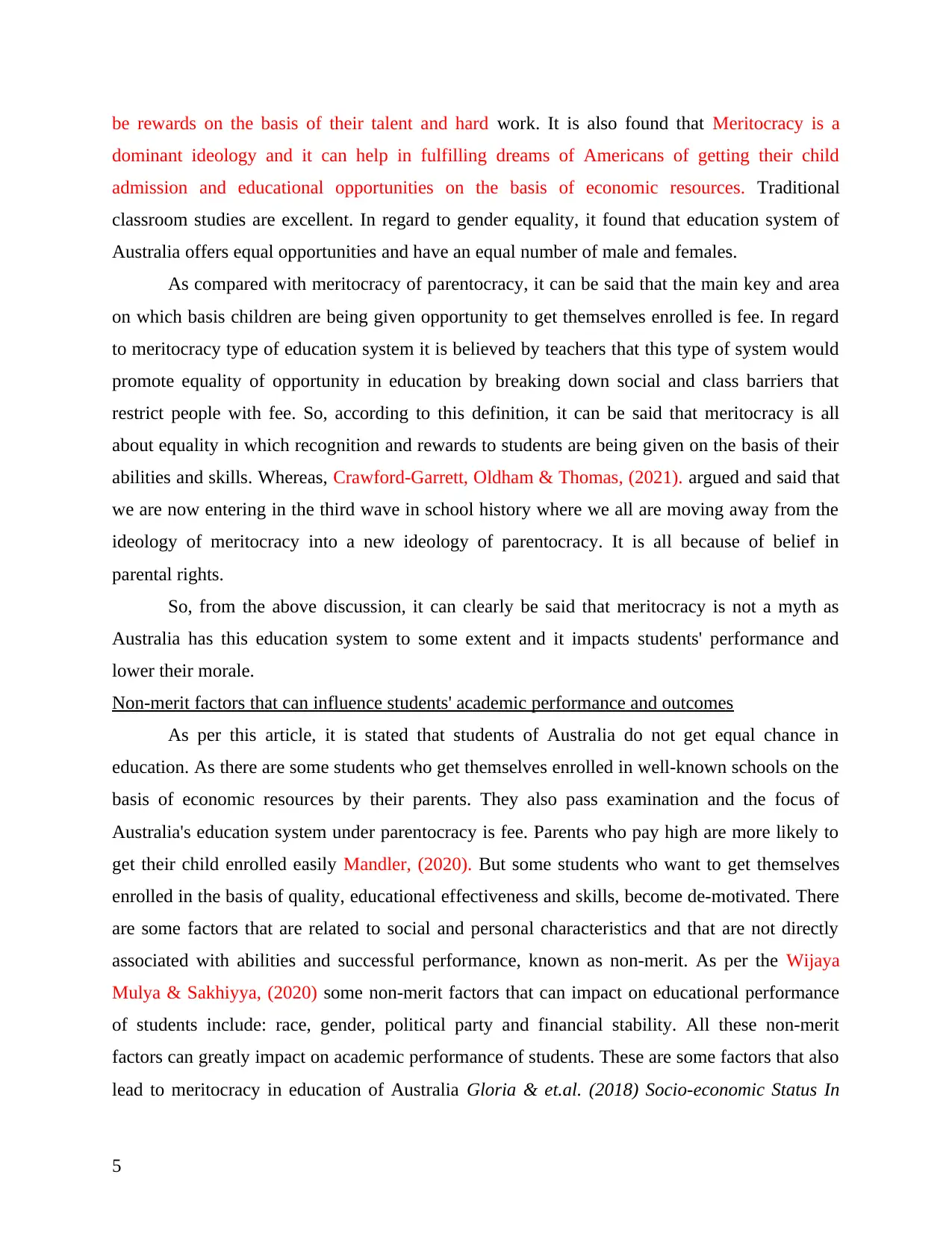
be rewards on the basis of their talent and hard work. It is also found that Meritocracy is a
dominant ideology and it can help in fulfilling dreams of Americans of getting their child
admission and educational opportunities on the basis of economic resources. Traditional
classroom studies are excellent. In regard to gender equality, it found that education system of
Australia offers equal opportunities and have an equal number of male and females.
As compared with meritocracy of parentocracy, it can be said that the main key and area
on which basis children are being given opportunity to get themselves enrolled is fee. In regard
to meritocracy type of education system it is believed by teachers that this type of system would
promote equality of opportunity in education by breaking down social and class barriers that
restrict people with fee. So, according to this definition, it can be said that meritocracy is all
about equality in which recognition and rewards to students are being given on the basis of their
abilities and skills. Whereas, Crawford-Garrett, Oldham & Thomas, (2021). argued and said that
we are now entering in the third wave in school history where we all are moving away from the
ideology of meritocracy into a new ideology of parentocracy. It is all because of belief in
parental rights.
So, from the above discussion, it can clearly be said that meritocracy is not a myth as
Australia has this education system to some extent and it impacts students' performance and
lower their morale.
Non-merit factors that can influence students' academic performance and outcomes
As per this article, it is stated that students of Australia do not get equal chance in
education. As there are some students who get themselves enrolled in well-known schools on the
basis of economic resources by their parents. They also pass examination and the focus of
Australia's education system under parentocracy is fee. Parents who pay high are more likely to
get their child enrolled easily Mandler, (2020). But some students who want to get themselves
enrolled in the basis of quality, educational effectiveness and skills, become de-motivated. There
are some factors that are related to social and personal characteristics and that are not directly
associated with abilities and successful performance, known as non-merit. As per the Wijaya
Mulya & Sakhiyya, (2020) some non-merit factors that can impact on educational performance
of students include: race, gender, political party and financial stability. All these non-merit
factors can greatly impact on academic performance of students. These are some factors that also
lead to meritocracy in education of Australia Gloria & et.al. (2018) Socio-economic Status In
5
dominant ideology and it can help in fulfilling dreams of Americans of getting their child
admission and educational opportunities on the basis of economic resources. Traditional
classroom studies are excellent. In regard to gender equality, it found that education system of
Australia offers equal opportunities and have an equal number of male and females.
As compared with meritocracy of parentocracy, it can be said that the main key and area
on which basis children are being given opportunity to get themselves enrolled is fee. In regard
to meritocracy type of education system it is believed by teachers that this type of system would
promote equality of opportunity in education by breaking down social and class barriers that
restrict people with fee. So, according to this definition, it can be said that meritocracy is all
about equality in which recognition and rewards to students are being given on the basis of their
abilities and skills. Whereas, Crawford-Garrett, Oldham & Thomas, (2021). argued and said that
we are now entering in the third wave in school history where we all are moving away from the
ideology of meritocracy into a new ideology of parentocracy. It is all because of belief in
parental rights.
So, from the above discussion, it can clearly be said that meritocracy is not a myth as
Australia has this education system to some extent and it impacts students' performance and
lower their morale.
Non-merit factors that can influence students' academic performance and outcomes
As per this article, it is stated that students of Australia do not get equal chance in
education. As there are some students who get themselves enrolled in well-known schools on the
basis of economic resources by their parents. They also pass examination and the focus of
Australia's education system under parentocracy is fee. Parents who pay high are more likely to
get their child enrolled easily Mandler, (2020). But some students who want to get themselves
enrolled in the basis of quality, educational effectiveness and skills, become de-motivated. There
are some factors that are related to social and personal characteristics and that are not directly
associated with abilities and successful performance, known as non-merit. As per the Wijaya
Mulya & Sakhiyya, (2020) some non-merit factors that can impact on educational performance
of students include: race, gender, political party and financial stability. All these non-merit
factors can greatly impact on academic performance of students. These are some factors that also
lead to meritocracy in education of Australia Gloria & et.al. (2018) Socio-economic Status In
5
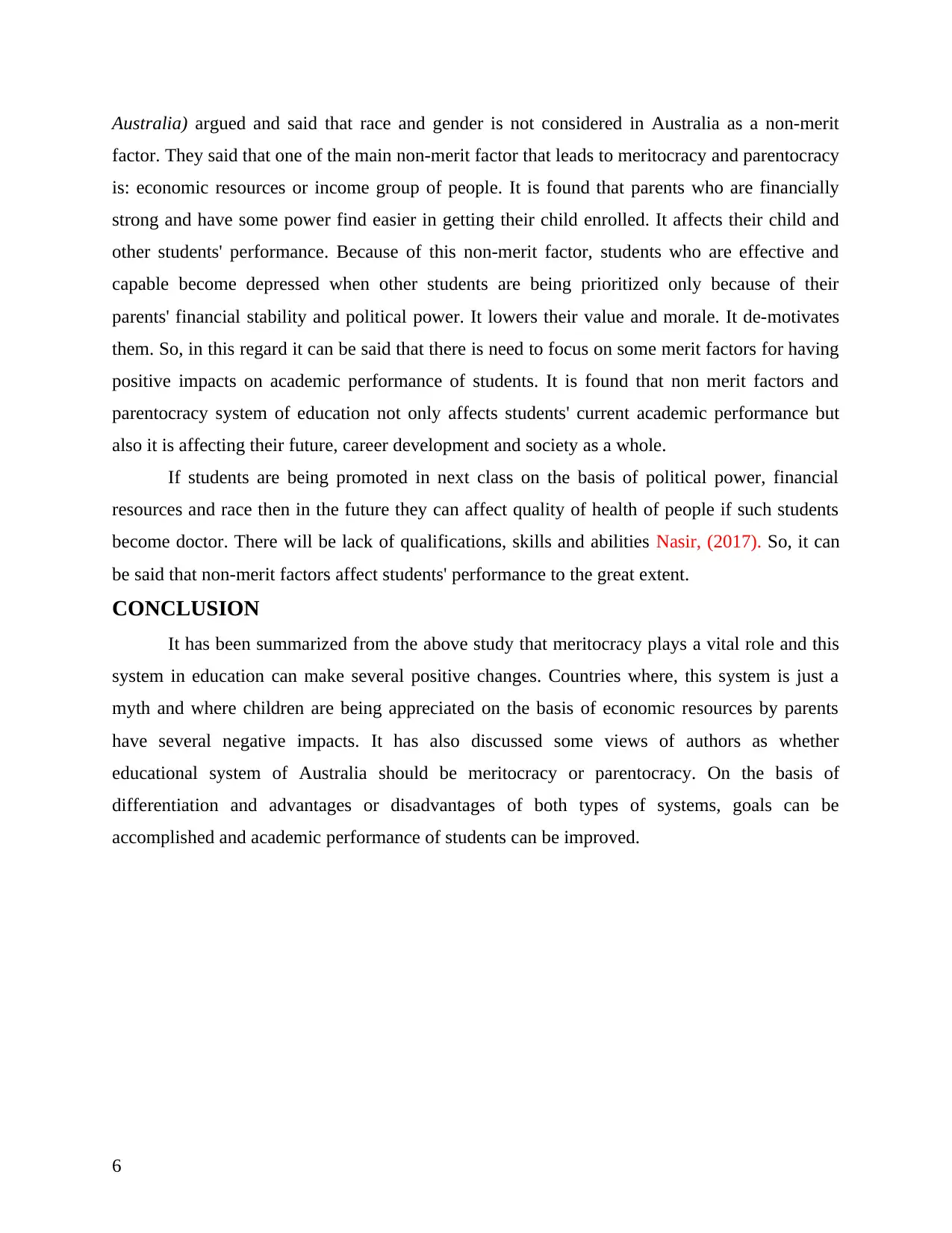
Australia) argued and said that race and gender is not considered in Australia as a non-merit
factor. They said that one of the main non-merit factor that leads to meritocracy and parentocracy
is: economic resources or income group of people. It is found that parents who are financially
strong and have some power find easier in getting their child enrolled. It affects their child and
other students' performance. Because of this non-merit factor, students who are effective and
capable become depressed when other students are being prioritized only because of their
parents' financial stability and political power. It lowers their value and morale. It de-motivates
them. So, in this regard it can be said that there is need to focus on some merit factors for having
positive impacts on academic performance of students. It is found that non merit factors and
parentocracy system of education not only affects students' current academic performance but
also it is affecting their future, career development and society as a whole.
If students are being promoted in next class on the basis of political power, financial
resources and race then in the future they can affect quality of health of people if such students
become doctor. There will be lack of qualifications, skills and abilities Nasir, (2017). So, it can
be said that non-merit factors affect students' performance to the great extent.
CONCLUSION
It has been summarized from the above study that meritocracy plays a vital role and this
system in education can make several positive changes. Countries where, this system is just a
myth and where children are being appreciated on the basis of economic resources by parents
have several negative impacts. It has also discussed some views of authors as whether
educational system of Australia should be meritocracy or parentocracy. On the basis of
differentiation and advantages or disadvantages of both types of systems, goals can be
accomplished and academic performance of students can be improved.
6
factor. They said that one of the main non-merit factor that leads to meritocracy and parentocracy
is: economic resources or income group of people. It is found that parents who are financially
strong and have some power find easier in getting their child enrolled. It affects their child and
other students' performance. Because of this non-merit factor, students who are effective and
capable become depressed when other students are being prioritized only because of their
parents' financial stability and political power. It lowers their value and morale. It de-motivates
them. So, in this regard it can be said that there is need to focus on some merit factors for having
positive impacts on academic performance of students. It is found that non merit factors and
parentocracy system of education not only affects students' current academic performance but
also it is affecting their future, career development and society as a whole.
If students are being promoted in next class on the basis of political power, financial
resources and race then in the future they can affect quality of health of people if such students
become doctor. There will be lack of qualifications, skills and abilities Nasir, (2017). So, it can
be said that non-merit factors affect students' performance to the great extent.
CONCLUSION
It has been summarized from the above study that meritocracy plays a vital role and this
system in education can make several positive changes. Countries where, this system is just a
myth and where children are being appreciated on the basis of economic resources by parents
have several negative impacts. It has also discussed some views of authors as whether
educational system of Australia should be meritocracy or parentocracy. On the basis of
differentiation and advantages or disadvantages of both types of systems, goals can be
accomplished and academic performance of students can be improved.
6
⊘ This is a preview!⊘
Do you want full access?
Subscribe today to unlock all pages.

Trusted by 1+ million students worldwide
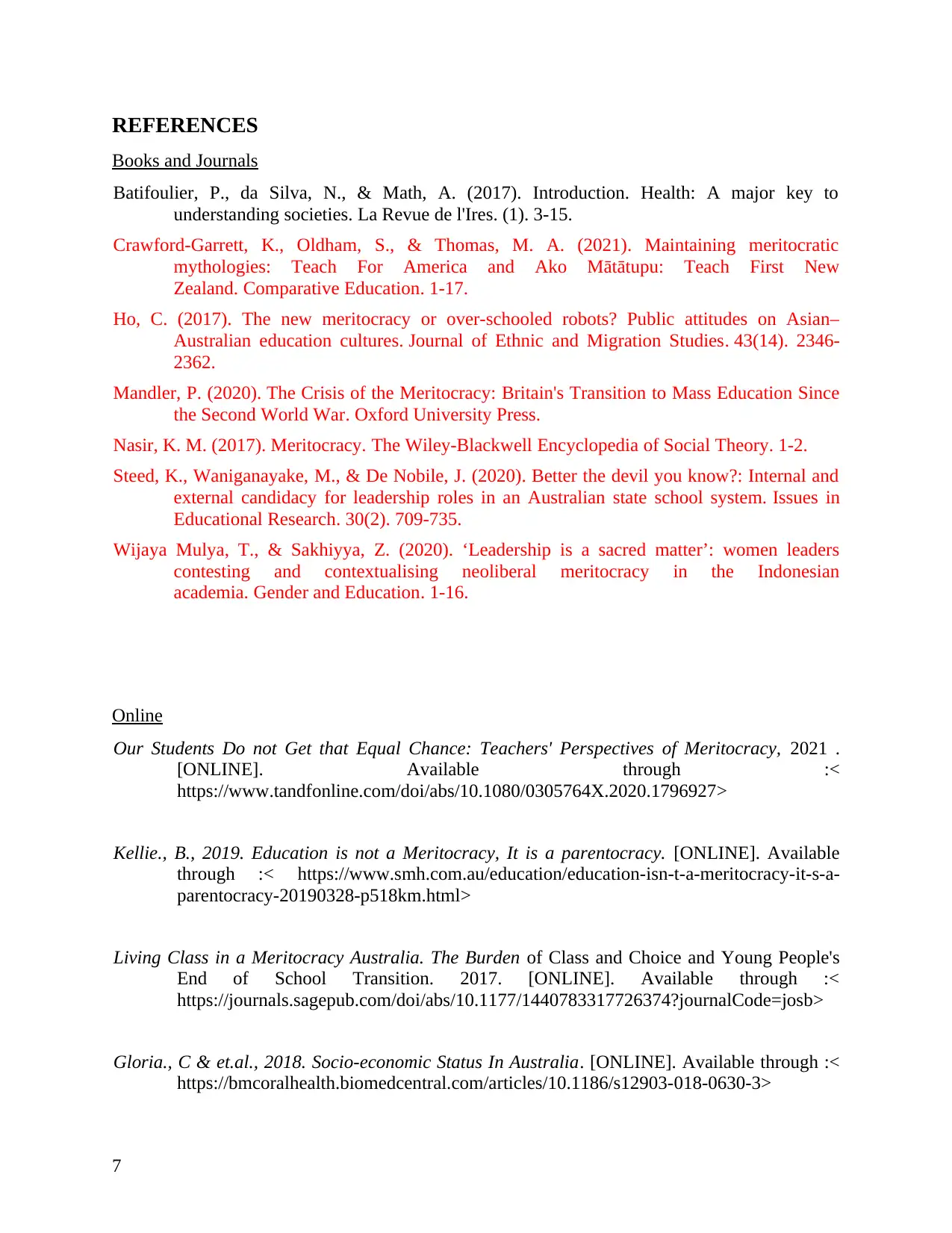
REFERENCES
Books and Journals
Batifoulier, P., da Silva, N., & Math, A. (2017). Introduction. Health: A major key to
understanding societies. La Revue de l'Ires. (1). 3-15.
Crawford-Garrett, K., Oldham, S., & Thomas, M. A. (2021). Maintaining meritocratic
mythologies: Teach For America and Ako Mātātupu: Teach First New
Zealand. Comparative Education. 1-17.
Ho, C. (2017). The new meritocracy or over-schooled robots? Public attitudes on Asian–
Australian education cultures. Journal of Ethnic and Migration Studies. 43(14). 2346-
2362.
Mandler, P. (2020). The Crisis of the Meritocracy: Britain's Transition to Mass Education Since
the Second World War. Oxford University Press.
Nasir, K. M. (2017). Meritocracy. The Wiley‐Blackwell Encyclopedia of Social Theory. 1-2.
Steed, K., Waniganayake, M., & De Nobile, J. (2020). Better the devil you know?: Internal and
external candidacy for leadership roles in an Australian state school system. Issues in
Educational Research. 30(2). 709-735.
Wijaya Mulya, T., & Sakhiyya, Z. (2020). ‘Leadership is a sacred matter’: women leaders
contesting and contextualising neoliberal meritocracy in the Indonesian
academia. Gender and Education. 1-16.
Online
Our Students Do not Get that Equal Chance: Teachers' Perspectives of Meritocracy, 2021 .
[ONLINE]. Available through :<
https://www.tandfonline.com/doi/abs/10.1080/0305764X.2020.1796927>
Kellie., B., 2019. Education is not a Meritocracy, It is a parentocracy. [ONLINE]. Available
through :< https://www.smh.com.au/education/education-isn-t-a-meritocracy-it-s-a-
parentocracy-20190328-p518km.html>
Living Class in a Meritocracy Australia. The Burden of Class and Choice and Young People's
End of School Transition. 2017. [ONLINE]. Available through :<
https://journals.sagepub.com/doi/abs/10.1177/1440783317726374?journalCode=josb>
Gloria., C & et.al., 2018. Socio-economic Status In Australia. [ONLINE]. Available through :<
https://bmcoralhealth.biomedcentral.com/articles/10.1186/s12903-018-0630-3>
7
Books and Journals
Batifoulier, P., da Silva, N., & Math, A. (2017). Introduction. Health: A major key to
understanding societies. La Revue de l'Ires. (1). 3-15.
Crawford-Garrett, K., Oldham, S., & Thomas, M. A. (2021). Maintaining meritocratic
mythologies: Teach For America and Ako Mātātupu: Teach First New
Zealand. Comparative Education. 1-17.
Ho, C. (2017). The new meritocracy or over-schooled robots? Public attitudes on Asian–
Australian education cultures. Journal of Ethnic and Migration Studies. 43(14). 2346-
2362.
Mandler, P. (2020). The Crisis of the Meritocracy: Britain's Transition to Mass Education Since
the Second World War. Oxford University Press.
Nasir, K. M. (2017). Meritocracy. The Wiley‐Blackwell Encyclopedia of Social Theory. 1-2.
Steed, K., Waniganayake, M., & De Nobile, J. (2020). Better the devil you know?: Internal and
external candidacy for leadership roles in an Australian state school system. Issues in
Educational Research. 30(2). 709-735.
Wijaya Mulya, T., & Sakhiyya, Z. (2020). ‘Leadership is a sacred matter’: women leaders
contesting and contextualising neoliberal meritocracy in the Indonesian
academia. Gender and Education. 1-16.
Online
Our Students Do not Get that Equal Chance: Teachers' Perspectives of Meritocracy, 2021 .
[ONLINE]. Available through :<
https://www.tandfonline.com/doi/abs/10.1080/0305764X.2020.1796927>
Kellie., B., 2019. Education is not a Meritocracy, It is a parentocracy. [ONLINE]. Available
through :< https://www.smh.com.au/education/education-isn-t-a-meritocracy-it-s-a-
parentocracy-20190328-p518km.html>
Living Class in a Meritocracy Australia. The Burden of Class and Choice and Young People's
End of School Transition. 2017. [ONLINE]. Available through :<
https://journals.sagepub.com/doi/abs/10.1177/1440783317726374?journalCode=josb>
Gloria., C & et.al., 2018. Socio-economic Status In Australia. [ONLINE]. Available through :<
https://bmcoralhealth.biomedcentral.com/articles/10.1186/s12903-018-0630-3>
7
Paraphrase This Document
Need a fresh take? Get an instant paraphrase of this document with our AI Paraphraser

8
1 out of 8
Related Documents
Your All-in-One AI-Powered Toolkit for Academic Success.
+13062052269
info@desklib.com
Available 24*7 on WhatsApp / Email
![[object Object]](/_next/static/media/star-bottom.7253800d.svg)
Unlock your academic potential
Copyright © 2020–2025 A2Z Services. All Rights Reserved. Developed and managed by ZUCOL.




